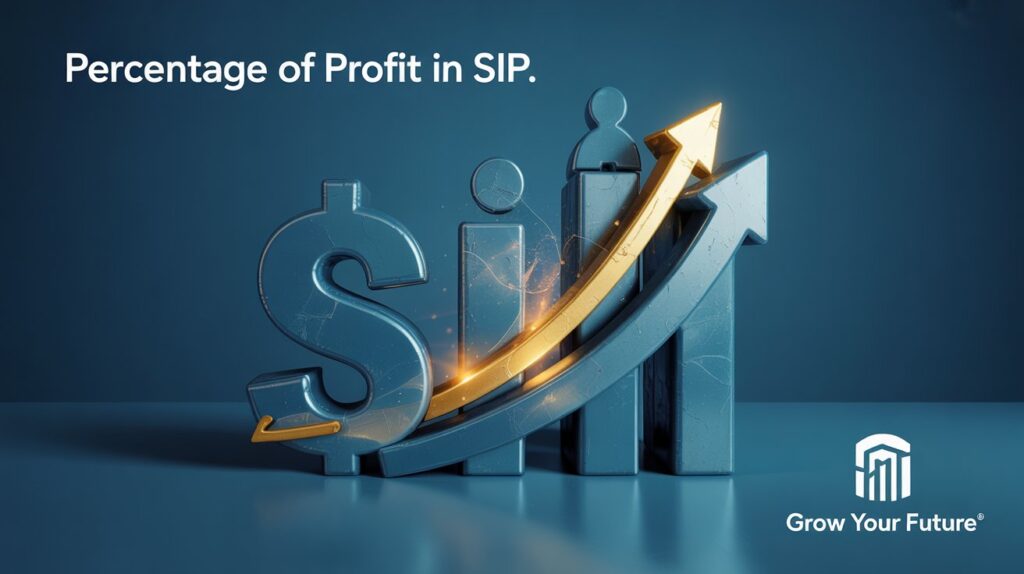SIPs (Systematic Investment Plans) have become a popular term for many Indian investors looking to create long-term wealth. As per the reports published by Business Standard, SIP registration is at an all-time high in April, contributing to 63.7 lakh new SIP investors.
Still, massive hype surrounds them, and one of the biggest and most often asked questions is, Is SIP really a good option? Is SIP really profitable? Many investors, even experienced ones, are unsure if SIPs give the kind of ongoing and lasting returns that they are supposed to.
This article will take a huge dive into SIPs, while taking a look at the real potential connected to SIPs and if they are really worth it or if they are simply hype. Let’s be real, whether you are a beginner or you have been investing for years, blanket statements are always going to be said or made when it comes to investing in SIPs.
If you really understand the real benefits of a SIP, you’re going to really figure it out for yourself because it’s up to you to know what you are going to do to make your financial future secure.
Relevant: How Safe is SIP?
Is SIP Really Profitable?
This is a concern shared by every first-time investor seeking to use investing as a means to grow their wealth over time. The answer, supported by data and real performance, is a definitive yes, but only if you remain invested for the long term. Let’s take a look.
A systematic investment plan (SIP) allows you to invest a set amount consistently in mutual funds. By investing through a SIP, your money grows gradually, and you have the power of compounding and rupee cost averaging to work with. This way, you are less affected by market volatility, which is a risk for investing in the market.
If, for example, you had invested ₹5,000 a month in the Nifty 50 index fund via SIP over the past 10 years, your total investment of ₹6 lakh would have turned into over ₹13 lakh (as of early 2025), which is an annualised return of approximately 12-13%. That is more than double the starting capital, and you didn’t have to worry about timing the market.
Is SIP really making money? Yes, SIPs can create some tangible wealth when you adopt the idea of making regular contributions in line with your risk profile and wealth ambitions. SIPs can create wealth in a structured way, especially for goal-based investing such as buying a home or funding your child’s education or an early retirement.
Now the term which begs the question: Is SIP really profitable in down markets? The short answer is that it depends on the discipline and patience of your investment strategy. Yes, short-term market fluctuations may result in a dip portfolio, but SIP allows you to acquire more units when prices are low, ultimately lowering your average cost and improving your upside potential over time. SIP is one of the best wealth-building tools for the correct mutual fund and the right time frame.
Is SIP Really a Good Option?
The straightforward and real answer to the question “Is SIP really a good option?” is yes when it comes to slowly building wealth without undue stress. Not only the newbie investor but also a lot of investors ask, “Is SIP really a good option?” and to support the answer, we will focus on the numerical and long-term advantages of SIPs. A Systematic Investment Plan (SIP) is a facility wherein a person invests a fixed sum at regular intervals in mutual funds, making it a great option for salaried people and anyone wanting to inculcate discipline into their financial life.
For instance, had someone invested only ₹5,000 per month in a good equity mutual fund SIP for the last 5 years, they would have accumulated over 6 lakhs (assuming a 12 per cent average annual return), whereas their total investment would only be ₹3 lakhs. The stats are for those who wish to see how compounding works in favour of an SIP investor, which is another good example.
What adds to the attraction of SIPs is their potential to provide a form of averaging and reduce volatility risks in the market. When you are buying at a low price, you get to purchase more units vs. buying fewer units at a higher price. That rupee cost-averaging reduces the impact of market price fluctuations.
Take 2020 as an example; even during the Covid-19-related crash, those investors who continued with their SIPs saw a strong recovery and growth by December 2021.
Is SIP really a good investment? Quite honestly, yes, especially if you prefer a set-it-and-forget-it style of disciplined investing and have no urge to make additional time-sensitive decisions with your investments.
SIPs help you save consistently, avoid having to guess when to enter the market, and work for novice investors as well as sophisticated investors. If you are building a dream toward long-term goals like buying a house or retiring comfortably.
Is SIP really a good option? Certainly, consider that SIP is one of the best financial habits you can achieve.
What percentage of profit can be expected in SIP?
When it comes to investing, perhaps the most common question asked is, What percentage of profit can I expect in SIP? Now the answer isn’t a fixed answer, but it presents well. Historically, SIPs (Systematic Investment Plans) in equity mutual funds have produced returns of between 10% and 15% (data may vary) per annum over the long term, depending on market and fund dynamics.
Right away, I know what you’re thinking, and the returns don’t seem that significant on a short-term view, but remember the compounding effect. That brings us to an important question: Is SIP really a good option? For most individuals, and especially employees and new investors, the answer is yes, because a SIP has benefits such as rupee cost averaging, disciplined investment, compounding effects, and a clear opportunity.
Does SIP generate attractive returns for retail investors? Based on the historical data, the returns earned, and the simplicity of investing small sums regularly meant that SIPs represent one of the more achievable, low-risk forms of investing available in the Indian investing landscape. In some ways, SIPs have much lower volatility when held for the long run. As with any market-related product, SIPs have risk, but longer durations of investment lead to lower volatility.
So, to the broader context of do SIPs generate wealth? Yes! As long as you can continue your SIP and avoid getting impatient. Many happy investors have benefited from the gains of staying invested in either positively or negatively moving markets. If you are still asking yourself, Are SIPs good for you, you only need to look at the success of a few investors you know who started low and consistently increased their investment. The answer is time and discipline.
Relevant: Average Return on Mutual Funds
Advantages of SIPs
- Disciplined Investing: SIPs promote a habitual approach to regular savings and disciplined investing to help individuals accumulate wealth over time.
- Rupee Cost Averaging: You, as an investor, will invest the same sum of money regularly. When the price of the investment is low, the investor purchases more units. When the price is high, purchase fewer units, which averages out in the investor’s favor.
- Flexibility: SIPs give investors flexibility in the amount they wish to invest and how frequently they wish to invest. An investor can start with a minimal investment amount of 500, and as their financial situation improves, the investments can also improve.
- Compounding Effects: The longer a person invests, the more compounding matters because it will potentially lead to higher returns.
Conclusion
In a world with financially uncertain value, SIPs still provide a stable and intelligent path to long-term wealth creation. So, is SIP really profitable? Absolutely yes, SIPs have consistently and historically produced great returns, despite the up-and-down market cycles, when used with consistency, patience, and proper fund selection. And is SIP really a good option? We know that SIPs are a great option for first-time investors as well as for investors looking to plan for future milestones like retirement or paying for their kids’ education. SIPs are the perfect combination of discipline, optionality and potential for capital appreciation





